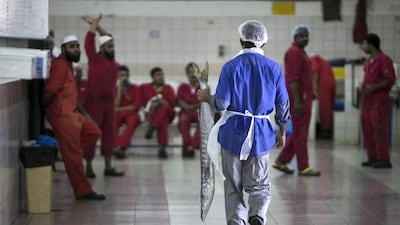ABU DHABI // As witnesses to the gradual decline in marine populations, fishermen in the UAE for years thought they had nothing to do with it.
The narrative, fishermen believed, was that habitat destruction as a result of rapid modernisation was solely responsible for their decreasing catches and, consequently, income.
“Fishermen care about domestic commercial fish. But some of them don’t see the beauty, the link between those species, the habitat and sustainability,” said Ahmed Al Hashimi, director of biological diversity at the Ministry of Climate Change and Environment.
“They are in love with the sea, it’s just that many of them did not know how responsible they were for its destruction.”
The reality is that fishermen often fish at coral reefs – the “cities of the ocean” – because they connect hauling in good catches to those areas, but they have unknowingly been wiping away entire colonies of coral by dropping anchor among it.
To help them to understand the implications, Mr Al Hashimi and the Environment Agency Abu Dhabi trained fishermen in sustainable fishing.
As a hard measure and to better protect the industry, the UAE labelled 10 per cent of its oceans as marine protected zones, prompting Yale University to award it a “best rating” in its Environmental Protection Index.
The move was met with reluctance by fishermen last March, with many demanding unlimited access to the seas.
Mr Al Hashimi believes fishermen would be more willing to scale down their catches if they were aware of just how depleted and endangered the seas were.
“When you’re close to the environment, it’s easy to love it and you’ll do anything to protect it,” he said. “All that is needed is some education and the rest will follow.”
Bu Mohammed, a fisherman who owns two boats and has more than 20 years in the industry, said it was hard for many of his colleagues to accept that they may have been a catalyst for the depletion of fish reserves.
“We’d drop our anchors without a second thought,” he said. “We had absolutely no idea that coral was something living and breathing and we were destroying it.”
For fishermen, the desire to protect the environment is coupled with a need to maintain their livelihood.
“Education changed a lot of things. One thing was clear – that we catch less,” said Bu Mohammed. “Yes, habitat destruction is a key component in that but, also, we had no idea. Now people are beginning to change their minds, maybe because of our love for the sea but also maybe because our catch yields are so low that a change is needed.”
He began changing his habits after learning more about the destruction fishing was causing.
But for years prior to that, fishermen thought that the reduction in fish stocks was solely the result of habitat destruction as a result of rapid modernisation.
“We are constantly being told by the authorities that we need to abide by the laws,” said K M, a representative from Fujairah fishermen’s society.
The Environment Agency Abu Dhabi is conducting a five-year survey on fisheries that should indicate if measures are working.
“If we don’t dive, at least we read and understand and, ultimately, respect. But these older fishermen, they had no idea. Some of them can’t read, so it was a shock and some, of course, still don’t accept it,” K M said.
nalwasmi@thenational.ae

